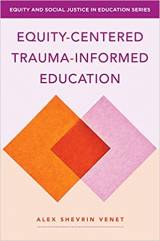
Unconditional constructive regard is a stance I absorb relationship to my college students. The message of unconditional constructive regard is, “I care about you. You’ve worth. You don’t must do something to show it to me, and nothing’s going to alter my thoughts.” I typically attempt to think about myself radiating unconditional constructive regard like a glow round me after I stroll right into a classroom. However I additionally really say these phrases to my college students in ways in which match our relationship. I be certain that to inform them I care about them, no matter what they accomplish or obtain in our tutorial work collectively. This care infuses all of my instructing decisions, from private interactions to studying design. Importantly, unconditional constructive regard stands in opposition to savior mentality and deficit considering.
Constructing Unconditional Relationships
A philosophy is essential, however solely as a lot as we put that philosophy into motion. Unconditional constructive regard is an fairness strategy once we actively put it into follow in our on a regular basis interactions with college students.
 Generally unconditional constructive regard is simply so simple as how we greet our college students when they’re late to class: how I greet them can talk both my unconditional care or my lack of regard. If I don’t have unconditional constructive regard, I’d say, “You’re late, sit down,” and roll my eyes, or I’d sarcastically say, “Good of you to indicate up.” These responses inform college students that I care about them solely so long as they observe my expectations—they’re an inconvenience. Even when I don’t imply to speak this, small moments add up. If college students involves my class and I roll my eyes, in the event that they go into the hallway and are informed to take off their hat, in the event that they sit down at lunch and are warned to talk extra quietly, then the cumulative message of college is that orderliness is a very powerful factor.
Generally unconditional constructive regard is simply so simple as how we greet our college students when they’re late to class: how I greet them can talk both my unconditional care or my lack of regard. If I don’t have unconditional constructive regard, I’d say, “You’re late, sit down,” and roll my eyes, or I’d sarcastically say, “Good of you to indicate up.” These responses inform college students that I care about them solely so long as they observe my expectations—they’re an inconvenience. Even when I don’t imply to speak this, small moments add up. If college students involves my class and I roll my eyes, in the event that they go into the hallway and are informed to take off their hat, in the event that they sit down at lunch and are warned to talk extra quietly, then the cumulative message of college is that orderliness is a very powerful factor.
As a substitute, I can greet my scholar with “Hey! It’s nice to see you immediately. Settle in a minute after which I’ll catch you up.” Once we work from unconditional constructive regard, the message is that I worth you for who you’re, not what you do or the way you do it. This doesn’t imply that I received’t handle attendance points later, however my precedence when my college students arrive isn’t to scold them about compliance. My precedence is to greet them in a manner that claims they matter and that their presence is extra essential than how briskly they bought right here.
Typically, slowing down most conversations with college students to easily ask, “How’s it going?” modifications the tone of my complete day. When visiting faculties as a part of my consulting work, it’s at all times stunning to me how sometimes I see lecturers stopping to simply examine in with college students all through the day, and even saying college students’ names. Creating an setting of care means going again to the fundamentals and never skipping the human connection of simply asking each other how we’re doing. This will likely appear to be an apparent level to make, however the foundation of unconditional constructive regard is the phrase “I care about you.” To care about another person implies that we see the sum of all of their strengths and challenges and select to look after them.
Our faculties should be locations the place we look after our college students, not simply care about them. Schooling thinker Nel Noddings calls this an “ethic of care,” by which studying the way to be cared for and studying the way to look after others are central duties of schooling. Caring for college kids means being in relationship with them, whereas caring about college students permits us to maintain our distance. If we decide to an ethic of care, constructing relationships and caring for our college students aren’t methods within the identify of accelerating tutorial achievement however the precise objective itself.
One of many foundations of caring is seeing and actually attending to know our college students. Too typically our approaches to relationship constructing in class can really feel transactional. I keep in mind that, as a brand new instructor, my technique for relationship constructing was to provide college students an extended survey to finish, telling me about their pursuits, studying types, and favourite colours. These kinds of “attending to know you” surveys are solely floor stage and don’t do a lot to create a caring relationship. Now I attempt to get to know college students the identical manner I’d get to know a brand new buddy: spending time collectively, asking questions on their lives and what they really feel captivated with, and speaking about what issues to us each. Actual relationship constructing isn’t flashy and might’t be condensed to “fifteen tips and ideas.” Generally constructing relationships means sitting collectively in silence and easily getting used to being round each other. Usually, relationship constructing occurs within the small moments, not in the course of the canned actions: I get to know my college students by way of fast check-ins earlier than class, by way of studying their papers and witnessing how their minds work, by way of noticing the methods they impart with their friends. Relationship constructing is sluggish and deliberate and might’t be rushed.

Alex Shevrin Venet is the writer “Equity-Centered Trauma-Informed Education.” She is an educator, skilled improvement facilitator and author. She teaches in-service lecturers at Antioch College and Castleton College, and undergraduate college students on the Neighborhood School of Vermont. She is a former instructor/chief at an alternate therapeutic faculty.
















